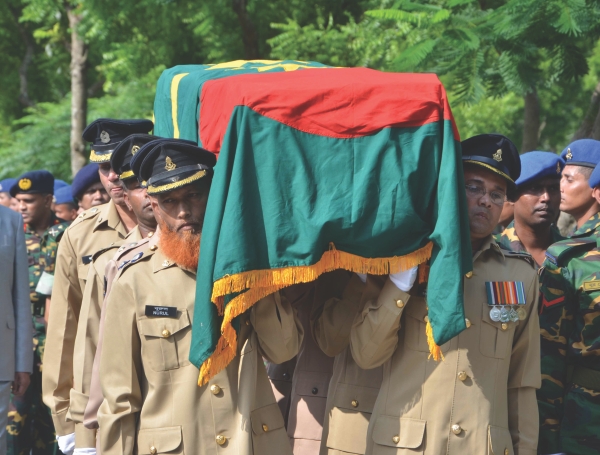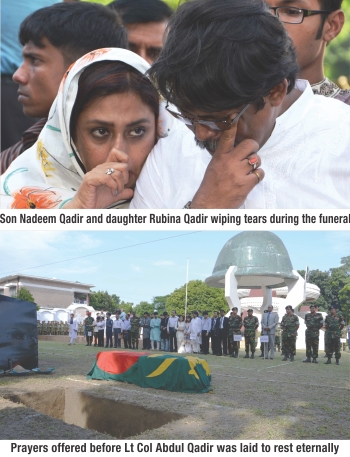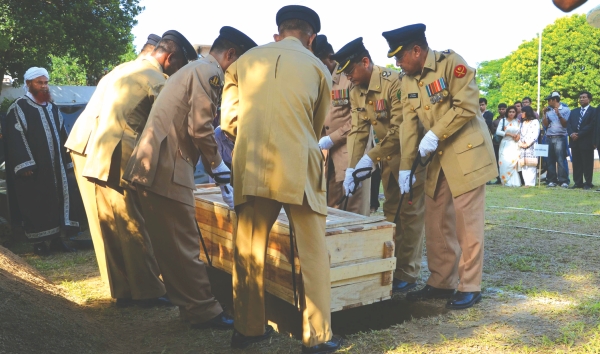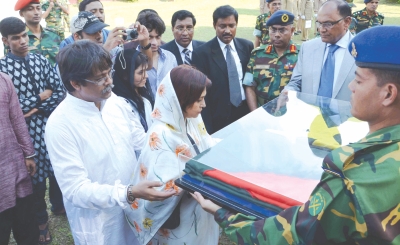Cover Story

Natore
Farewell of a Martyr
“O Captain, my Captain! Rise up and hear the bell;
Rise up - for you the flag is flung - for you the bugle trills;
For you bouquets and ribbon'd wreaths for you the shores a-crowding;
For you they call, the swaying mass, their eager faces turning.”
-Walt Whitman
reads the bronze memorial plaque at the Head of Lt. Col. Qadir's final resting place, placed there by his fellow sappers after finding his dead remains over 40 years after his death. A senior army official in his mourning address said, “This grave of the war hero will remain as the source of inspiration for members of the sappers' family and for the compatriot new generation”.
.................................................................................................
Anwar Ali
Whenever I think about our valiant freedom fighters, one thing crosses my mind repeatedly: joining the Liberation War could never have been easy. Is it easy to sacrifice one's life? Even with that persistent question in hand, millions sacrificed themselves in 1971 for the country's independence. Bangladesh is just a few years older than me, and maybe that was the reason why I could not comprehend the gravity of the sacrifices faced by my people. My perceptions were greatly amended when I witnessed the funeral of the valiant Martyr Lt. Col. Mohammed Abdul Qadir at the Qadirabad Cantonment graveyard. This was the first time that I had the opportunity to witness, through my own eyes, the burial of a Martyr after the return of his body to the motherland. Martyr Qadir's re-burial was state-honored, and the ceremony was held on 20 September 2011, nearly 40 years after his martyrdom.
 It felt as if the clocks had taken to warp speed and turned back to a time four decades into the past. It was as if the new generation was there to witness the hero standing in front of the audience himself. A sensational feeling of witnessing the hour of independence after gargantuan sacrifices and seas of tears being spilled crept up my spine. It was at that moment that the true sense of my existence was evident to me. I had grasped the exact meaning of my identity, which would not have been here now if it were not for the likes of Martyr Qadir and the millions of youth of this soil being spent in the war. Just like the uncountable number of families, Qadir's family had to bear such a huge loss without any recovery. It felt as if the clocks had taken to warp speed and turned back to a time four decades into the past. It was as if the new generation was there to witness the hero standing in front of the audience himself. A sensational feeling of witnessing the hour of independence after gargantuan sacrifices and seas of tears being spilled crept up my spine. It was at that moment that the true sense of my existence was evident to me. I had grasped the exact meaning of my identity, which would not have been here now if it were not for the likes of Martyr Qadir and the millions of youth of this soil being spent in the war. Just like the uncountable number of families, Qadir's family had to bear such a huge loss without any recovery.
Carrying out the role of a journalist becomes very cumbersome and nearly impossible while not being able to pay proper homage to a hero such as Qadir during the moments of absolute silence since I was constantly taking photographs and taking notes. But, then again, it was an incomparable experience to have witnessed the nation paying their due respects to such a hero in finding a final resting place after 40 years. Eight lieutenant colonels from the engineering corps served as the pall-bearers a fitting arrangement as Qadir himself served as a lieutenant colonel till he breathed his last. The procession up to his grave was headed by the Liberation War Affairs State Minister Capt. (retired) AB Tajul Islam and a number of army generals, joined by many other officers from the armed forces in the solemn march. The coffin was laid in the grave decorated with bouquets of flowers. The hero was given his well deserved ceremonial farewell with gun salutes, hand salutes and volley-fires. It was one thing to have seen the family breakdown in tears, while it was absolutely spine tingling to have witnessed the hundreds of the masses outside the graveyard intently watching the whole ceremony in silence with tears in their eyes.
Two scores years ago, Qadir had left behind an infant son. The toddler, Nadeem Qadir (Ontu), is now a grown man and is considered a veteran journalist. The miseries and pain the family had to endure all these years was shown on this grown man's face as he struggled to keep back the welling tears and spoke to reporters with a quivering voice after the whole ceremony. Nadeem could finally say, “I have found my father at last.” He was witness to the cruel and inhuman act of the Pakistani invading army snatching away his father. It had taken him over 36 years to track his father down, and to have found him in an unnamed grave in 2007. After learning that the grave was in Chittagong, all his family members and many other army officials helped collect the soil from the resting place to be brought back to Natore, his final destination. As the name suggests, Qadirabad Cantonment was named after the valiant martyr in 1983, and has always served as garrison for military engineers, his corps' members.
Lt. Col. Qadir was born on January 2, 1929, and had ever since been a proud patriot. He was commissioned in the Corps for Engineers in 1949. The fellow Pakistani army officers at that time had given him the nickname of 'Bhashani', as he always voiced his opinions on 'Autonomy of East Pakistan' and the 'Six-point demand'. The level of his patriotism was so high that he had to face an event of court martial on charges of badly injuring a Pakistani officer, as the other man had abused the word 'Bangali' in a very derogative manner. He was obviously found innocent in the case.
 |
Lieutenant colonels lowering the coffin of the martyr |
Qadir had passed engineering achieving first division with distinctions from Army School of Engineering in 1962, a rare feat to be achieved by a Bengali officer during the Pakistan rule. He went on and pursued the engineer's carrier course from Virginia, USA in 1965. He later graduated in Physics from the University of Dhaka and was promoted to the post of lieutenant colonel in 1966. Qadir joined as the chief of Oil and Gas Development Corporation of East Pakistan - now called Petrobangla - during 1970 while in Chittagong thwarting an offer to join in Jordan. He preferred Chittagong over going abroad with a dream of seeing Independent Bangladesh. Qadir was so determined and such a big believer in the War of Independence, that he had donated Tk. 10,000/- to the Awami League in February 1971 as they were in need of funds to make the war possible.
Even when warned against it, Qadir went ahead and hoisted the Bangladesh flag in his office, his vehicle and his residence. He couldn't have cared less, because his patriotism was greater to him than anything else. Qadir had written a letter to the martyred national hero AHM Qamaruzzaman detailing how the West Pakistan was non-cooperating to the then East Pakistan Oil and Gas Development Corporation. He used to help freedom fighters at every opportunity he could get hold of and used to provide them with supplies of explosives meant for the use of oil and gas exploration. Shovapur Bridge was damaged using these explosives. Qadir was also harassed and arrested for some time in connection with the Agortala conspiracy case.
The martyr had tried several times to join the war since the Pakistani invaders captured Chittagong on March 27. He had disappeared some time in April and had returned to his residence in Panchlaish on April 14 after failing to have made his way out from the town with other freedom fighters. Three days later on April 17, the Pakistani army arrested him from his residence, killed him, and despite being a senior officer, buried him without letting his family know anything about his whereabouts. They further taunted and played mind games with the family, as the Pakistani officer who had led the arrest had come back to the family a few days later and assured them of Qadir's short return. Qadir's wife, Hasna Hena Qadir, had passed away in 1999 still believing that her husband would return one day. Hasna Hena had been always accompanied by Shaheed Janani Zahanara Imam in the post liberation movement for trying the war criminals. It was Nadeem who had to face reality and confront the fact that his father was dead. He came to terms with it only after he found the unnamed grave.
 |
Liberation war minister Capt (Retd) AB Tajul Islam handing over
Bangladesh National and Army flag to the martyr's family members |
Nadeem's quest of finding his father will sound like a fairy tale, but reality is sometimes not so different, as angels sometimes are encountered in real life sometimes, making us believe in miracles. Nadeem had begun his quest in 1991. He used to offer prayers for the grave and float flowers on Foyes Lake, believing it to be his father's final resting place. Yet, he could at the same time never come to believe in totality that the lake could be the actual grave. He used to thus go around the city talking to anyone and everyone while showing them pictures of his martyred father. He used to relay to them stories of Qadir's heroism and patriotism, in hopes that one of them would recognize him and show Nadeem the path in finding the grave. It was in 1994 that he dreamt Qadir visiting him and assuring Nadeem that the grave would be found one day. But years passed away and possibilities of finding the grave became graver.
Nadeem's senses were tingling in November 2007, a time when he had gone to Chittagong to deliver a lecture to a team of aspiring army officers ready to take part in the UN Peacekeeping Mission in Sudan. As was his habit, he started telling stories about his father. The stories struck a little familiar to one of the officers, Lt. Col. Bayazid, who later gave Nadeem a book titled 'Bangaleer Jatiyabadi Sangram, Muktijuddhe Chattagram' authored by researcher Dr. Mahfuzur Rahman.
The book mentioned that Lt. Col. Qadir was killed along with 35 others in Panchlaish behind the Apollo Poly Clinic in front of the Chittagong Medical College. Nadeem could not let such a huge claim pass by, and so had met up with the author. Dr. Rahman listened to Nadeem's story and immediately took him to a live eye witness of the killings on that fateful day. The witness is a businessman named Nurul Islam, and was a member of the local Awami League in 1971. The man could not control his emotions on seeing Nadeem; he ended up helping the martyr's son with everything in his power and finally had helped him identify Qadir's unnamed grave.
Nurul Islam confirmed the burial of 18 others along with Qadir at the Panchlaish site on April 27, 1971. Later in 2008, a special four-member investigation team, led by Brig. Gen. Abul Hossain confirmed the provided data as accurate. The government alongside the Bangladesh Army later arranged for protection of Qadir's grave, and his reburial at Qadirabad cantonment with full state-honors. The government also issued a postal stamp of Martyr Qadir as one of the Martyred Intellectuals of Bangladesh.
Photographs by Anwar Ali
Copyright
(R) thedailystar.net 2011
|


 It felt as if the clocks had taken to warp speed and turned back to a time four decades into the past. It was as if the new generation was there to witness the hero standing in front of the audience himself. A sensational feeling of witnessing the hour of independence after gargantuan sacrifices and seas of tears being spilled crept up my spine. It was at that moment that the true sense of my existence was evident to me. I had grasped the exact meaning of my identity, which would not have been here now if it were not for the likes of Martyr Qadir and the millions of youth of this soil being spent in the war. Just like the uncountable number of families, Qadir's family had to bear such a huge loss without any recovery.
It felt as if the clocks had taken to warp speed and turned back to a time four decades into the past. It was as if the new generation was there to witness the hero standing in front of the audience himself. A sensational feeling of witnessing the hour of independence after gargantuan sacrifices and seas of tears being spilled crept up my spine. It was at that moment that the true sense of my existence was evident to me. I had grasped the exact meaning of my identity, which would not have been here now if it were not for the likes of Martyr Qadir and the millions of youth of this soil being spent in the war. Just like the uncountable number of families, Qadir's family had to bear such a huge loss without any recovery. 
